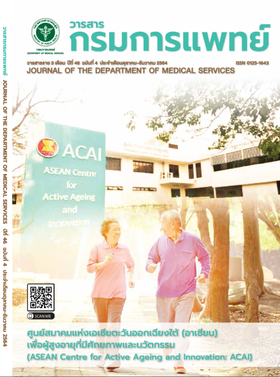New Model Development of Pharmaceutical Care for Epilepsy Patients
Keywords:
Epilepsy disease, Pharmaceutical care, Medication adherence, control seizure, New development, Epilepsy disease, Pharmaceutical care, Medication adherence, Control seizure, New model developmentAbstract
Background: Most of the drug related problems encountered in epilepsy clinics are often medication adherence which may affect seizure control.Objective: To study the effect of seizure control and medication adherence after receiving new development of pharmaceutical care for epilepsy patients at Neurological Institute of ThailandMethod: Collected data from 120 epilepsy patients who received services at the outpatients department between May 2019 and March 2020, Patients with epilepsy who had seizure frequency greater than or equal to 1 time in the past 1 month, patients who could use various research programs on smart phones and never received pharmaceutical care were selected by simple random sampling and randomly assigned to either the study group (epilepsy patients receiving the new epilepsy pharmaceutical care) or control group, each group comprised 60 patients. Seizure control and medication adherence data were collected by interviews and self-administered forms before and after received new pharmaceutical care.Result: After receiving the new epileptic pharmaceutical care, it was found that there was increase in mean scores of medication adherence and statistically significant decrease in seizure frequency (p<0.05). There was a negative correlation between increased medication adherence with reduced seizure frequency.Conclusion: New epilepsy pharmaceutical care would be helpful in making patients realize the importance of taking medicines. The more medication adherence, as a result epileptic patients can control their seizures better.
References
Asawavichienjinda T, Sitthi-Amorn C, Tanyanont W. Prevalence of epilepsy in rural Thailand: a population-based study. J Med Assoc Thai 2002; 85: 1066-73.
Khon Kaen University, Faculty of Medicine. Epilepsy research group Srinagarind Hospital Faculty of Medicine, Khon Kaen University. Khon Kaen: Faculty of Medicine; 2005.
Wong IC, Lhatoo SD. Adverse reactions to new anticonvulsant drugs. Drug Saf 2000; 23:35-56.
Perucca E. Clinically relevant drug interactions with antiepileptic drugs. Br J Clin Pharmacol 2006; 61: 246–55.
Walia KS, Khan EA, Ko DH, Raza SS, Khan YN. Side effects of antiepileptic a review. Pain Pract 2004; 4:194-203.
Das K, Banerjee M, Mondal GP, Devi LG, Singh OP, Mukherjee BB. Evaluation of socio-economic factors causing discontinuation of epilepsy treatment resulting in seizure recurrence: a study in an urban epilepsy clinic in India. Seizure 2007; 16:601-7.
Alldredge BK. Seizure Disorders. In: Herfindal ET, Gourley DR, editors. Textbook of Therapeutics: Drug and Disease Management. 6th ed. Baltimore: Williams & Wilkins; 1996.
Jaiklom C, Ausavutmugkul T, Bunyapat N. Effect of Pharmaceutical Care in Epileptic Patients at Prasat Neurological Institute. Journal of the Department of Medical Services 2016; 41: 110-9.
Chutimaskul W. E-Service for Ageing Society. National Research University 2554-56. [Internet]. 2014[cited 2021 Aug 8]. Available from https://www2.sit.kmutt.ac.th/NRU/report/Final_NRU_ Report_2014.pdf.
Downloads
Published
How to Cite
Issue
Section
License
Copyright (c) 2022 Department of Medical Services, Ministry of Public Health

This work is licensed under a Creative Commons Attribution-NonCommercial-NoDerivatives 4.0 International License.
บทความที่ได้รับการตีพิมพ์เป็นลิขสิทธิ์ของกรมการแพทย์ กระทรวงสาธารณสุข
ข้อความและข้อคิดเห็นต่างๆ เป็นของผู้เขียนบทความ ไม่ใช่ความเห็นของกองบรรณาธิการหรือของวารสารกรมการแพทย์



